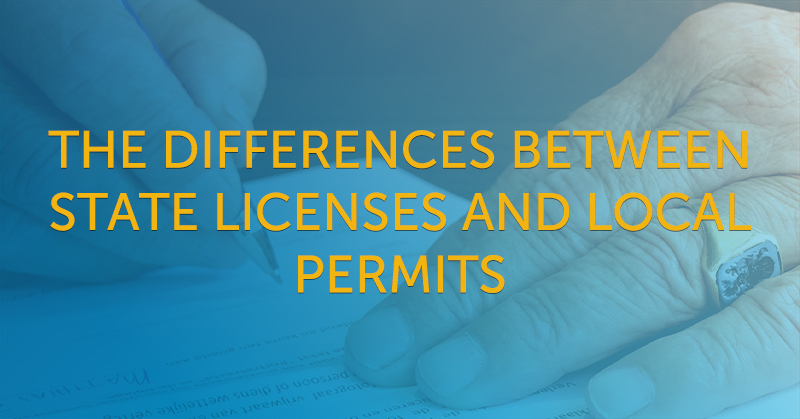The Differences Between State Licenses and Local Permits

If you own or operate an architecture or engineering firm, you are likely aware of your state’s licensing requirements. However, certain jobs and services you perform may be subject to additional permitting requirements.
The primary difference between licenses and permits is that licenses represent the permission to do or use something, while permits are typically issued based on safety issues. Keep reading to learn more about the difference between state licenses and local permits and how you can ensure your business remains in compliance.
What Are State Licenses?
A state business license is a primary document required for conducting essential business functions and for tax purposes. Without the correct licenses, your business can face fines, closures, delays, and other penalties.
To obtain the required licensure, businesses must first identify which licenses are required for their industry across federal, state, and local agencies. Most states require general business licenses. A general business license gains authorization from a government agency to operate in a country, state, city, or other jurisdiction. Industry-specific licenses are overseen by boards dedicated to the standards of the industry.
It is not uncommon for regulatory boards to require both key individuals and the company as a whole to obtain licenses. Individual licenses are typically acquired first and usually require an exam. Then, the company licenses are obtained after one or several key individuals are licensed.
State License Examples
State requirements vary; however, licenses are often required for the following businesses:
- Architecture Firms
- Asbestos Abatement Company
- Biomedical Engineering Firms
- Construction Companies
- Engineering Firms
- Electrical Contract Company
- Geology Firms
- Hazardous Materials Transportation
- Lead Abatement Company
If you are unsure whether your business requires a license to operate, check with your state’s regulatory agencies. Licenses are typically renewed on an annual or biennial basis.
What Are Local Permits?
A permit is a legal document that provides official permission to proceed with a restricted activity. Different types of permits are issued for various purposes. While licensing requirements vary from state to state, permit requirements differ across smaller jurisdictions, like counties and cities.
Jurisdiction requirements vary; however, permits are often required to:
- Construct or alter a structure
- Demolish or move a structure
- Install or alter regulated equipment, including:
- Air conditioning
- Electrical service
- Heating equipment
- Plumbing
There are also temporary permits that allow businesses to operate on a transient basis for activities like hosting a conference, using a public facility, and doing certain contract work.
Local Permit Examples
The most common permits include:
- Building permits
- Fire permits
- Health permits
- Occupational permits
- Sign permits
- Tax permits
- Zoning permits
If you are unsure whether your business requires a permit to provide a certain service, check with your local regulatory authority. Permits are typically nonrenewable and issued on a case-by-case basis.
Manage Your Firm’s License Requirements
Whether you manage licenses internally or outsource to our experts, the Harbor Compliance software suite – powered by Compliance Core™ – simplifies the process of researching, applying for, managing, and renewing your licenses.
- Compliance Core™ is Harbor Compliance’s proprietary technology powering the entire platform
- Requirements Research Engine simplifies the process of researching license requirements
- License Manager tracks individual and company licenses
The Harbor Compliance Suite allows you to manage your corporate and individual licenses using our easy-to-use SaaS platform. If you choose to outsource to our Managed Licensing Service, you’ll have complete visibility into all licensing statuses in License Manager and gain peace of mind that all your licensing needs are met.
If you are looking for help keeping your business compliant, we are here to help. Contact us today to learn more about our software and services or schedule a demo.
© 2022 Harbor Compliance. All rights reserved.
Harbor Compliance does not provide tax, financial, or legal advice. Use of our services does not create an attorney-client relationship. Harbor Compliance is not acting as your attorney and does not review information you provide to us for legal accuracy or sufficiency.

